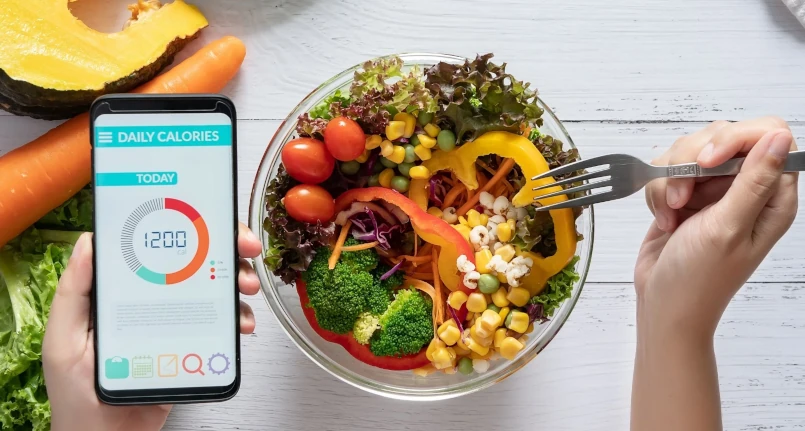Calorie counter app
There are more and more applications that offer accurate monitoring tools for some health indicators. Counting daily steps, calories and physical activity if on the one hand offers greater awareness of one’s lifestyle, on the other hand it can present numerous health risks.
How do calorie counting apps work?
With the increase in the use of smartphones and tablets, numerous applications have been developed and disseminated to monitor daily behaviors in the field of health and nutrition . In fact, there are apps that allow you to evaluate certain health parameters, such as taking physical activity into account, counting steps and recording your daily food
intake in order to calculate your caloric intake. In particular, “calorie counter apps” are very widespread , that is, applications that allow you to record the calorie intake of individual meals and set weight goals , monitoring the trend with graphs and percentages and dividing the food according to different parameters .
The objective of these tools is to offer support for the management of calories consumed daily and to evaluate the breakdown of the relative nutrients , providing useful data to gain greater awareness of one’s diet and lifestyle. In fact, many studies have highlighted the benefits of these measurements in managing one’s health. But, although these applications are very useful to learn more about some data, the use of them can encourage dysfunctional psychological modalities, such as, for example, hypercriticism, perfectionism or obsession.
The daily use of applications that monitor in detail the calories introduced can promote behaviors of excessive worry, dysfunctional eating and favor mechanisms typical of eating disorders . Recent research has shown, in fact, that constant calorie monitoring through these apps is often associated with eating disorders.
The risks of strict calorie tracking
When, rather than flexibly adopting the general guidelines applied to our personal condition, absolute and highly selective food rules are followed , a control mechanism can be triggered which can often lead to the implementation of a “strict diet”, i.e. a rigid and characterized by many rules.
The constant concern for food and the consequent emotional stress trigger the so-called “cognitive dietary restriction” , i.e. a way of thinking that encourages a dysfunctional approach to one’s way of eating , leading, in fact, to restrictions, binges and feelings of blame, even when there is no effective calorie restriction.
According to some studies, calorie counting apps can promote the adoption of a restrictive and unbalanced diet, therefore, they should not be used by those who may develop an eating disorder. The rigid monitoring defined by these apps leads, in fact, to overestimating the importance of body shape and triggering constant control of one’s weight, values and lifestyle metrics.
In a study by Linardon and Messer, participants who used calorie-counting apps showed higher levels of food control and concern with frequent binge eating and compensatory behaviors. In another study by Levinson, Fewell, and Brosof, 73% of people said that the calorie counter app contributed at least some part to the development of their eating disorder.
Therefore, it seems that the use of certain applications can contribute to triggering or maintaining some typical modalities of eating disorders , such as dichotomous thinking, excessive assessment of weight and body shape, dietary restriction and consequent binges. It is not possible to determine the existence of a causal relationship between the use of calorie counting apps and the onset of eating disorders, but it is now certain that the high use of calorie monitoring tools leads to consolidating behaviors connected to food disorders.
If the use of calorie counter apps is not carefully managed, it can generate a highly rigid approach resulting in strict diets, extreme physical exercise sequences, body dissatisfaction and a sense of failure for the times when the set table is not fully respected. If we consider calories as an aspect to be over-controlled at all times, any behavior outside the pattern will be seen as a “slack” that must be deserved or compensated for.
The use of calorie counting apps can, therefore, trigger, maintain, exacerbate the symptoms of eating disorders.
In the light of these data, it is important to spread greater awareness of the risks deriving from the use of these apps and their dangers to the health of those who use them.
Counting calories: a dangerous business
In recent years, the market for body parameters control devices has grown rapidly, generating significant profits. In fact, within our society, calorie restriction is an aspect that is often valued and confused for an indicator of merit of the person or of his “willpower”; conversely, loosening calorie control and consuming meals outside of one’s plans is often considered a “failure” or a symptom of “weakness.”
We are constantly exposed to hypercritical attention towards the aesthetics of the body, through the dissemination of unattainable models of perfection or erroneous messages, such as, for example, the encouragement to undertake detox diets after every holiday or the invitation to “pass” the ” costume test ” in the best possible way. These formulas trigger a continuous frustration with one’s physical form, prompting, in some cases, to adopt a highly rigid lifestyle based on sacrifices and deprivations.
In reality, in order to establish a truly healthy and conscious relationship with our body, rather than promoting practices such as restriction or self-control, it is important to educate to listen more to our needs, free from feelings of guilt, sacrifices, merits or stiffness. If one abandons the guilt-inducing vision of certain foods, considered “scares” to be condemned or compensated, one could adopt a more welcoming attitude, in which the variations to the scheme can be accepted as natural and necessary moments within a general style of sustainable living . Therefore, it is important to improve and protect your personal psycho-physical balance, abandon the concept of sacrifice and restriction and learn to listen to your body with flexibility, without ignoring its signals just because, at times, they are unfavorable to the imposed metrics.
We are much more than a number on the scale, a graph at the end of a meal, a vote at the end of the day : the obsessive verification of all the parameters related to our health and body aesthetics is unsustainable for the person as a whole. Food is not just calories and macronutrients : a more curious and less guilty approach to nutrition will lead to more effective results from the point of view of health, both in its physical and mental dimension.
In the light of the above, it is therefore important to underline how each person and each stage of life has its own specific needs. Calorie counter applications cannot replace the assessments and personalized programs proposed by health professionals. In the context of lifestyle, it is of fundamental importance to consider individual needs, physical and psychological, as priorities, and adapt them clinically to the individual’s medium and long-term goals. Only with the help of one or more professionals will it be possible to define and evaluate certain aspects of one’s health in a safe way, this being not only a set of data and statistics, but a state of general, physical, but also mental and social well- being .




